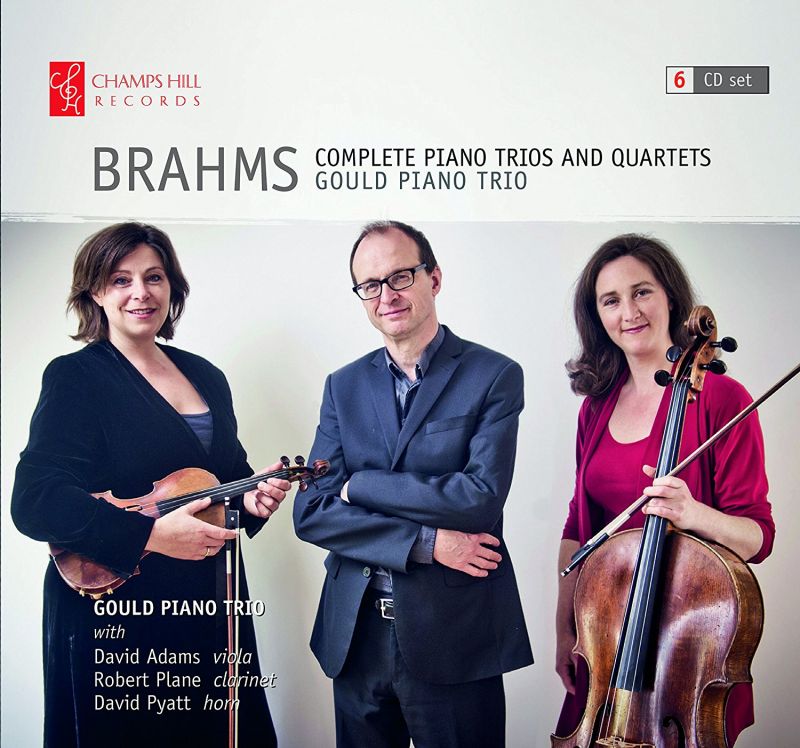BRAHMS Complete Piano Trios and Quartets
View record and artist detailsRecord and Artist Details
Composer or Director: Johannes Brahms
Genre:
Chamber
Label: Champs Hill
Magazine Review Date: 12/2017
Media Format: CD or Download
Media Runtime: 410
Mastering:
DDD
Catalogue Number: CHRCD129

Tracks:
| Composition | Artist Credit |
|---|---|
| Piano Trio No. 1 |
Johannes Brahms, Composer
Gould Piano Trio Johannes Brahms, Composer |
| Piano Trio No. 2 |
Johannes Brahms, Composer
Gould Piano Trio Johannes Brahms, Composer |
| Piano Trio No. 3 |
Johannes Brahms, Composer
Gould Piano Trio Johannes Brahms, Composer |
| Piano Trio |
Johannes Brahms, Composer
Gould Piano Trio Johannes Brahms, Composer |
| Trio for Horn/Viola, Violin and Piano |
Johannes Brahms, Composer
Gould Piano Trio Johannes Brahms, Composer |
| Trio for Clarinet/Viola, Cello and Piano |
Johannes Brahms, Composer
Gould Piano Trio Johannes Brahms, Composer |
| Piano Quartet No. 1 |
Johannes Brahms, Composer
Johannes Brahms, Composer |
| Piano Quartet No. 2 |
Johannes Brahms, Composer
Gould Piano Trio Johannes Brahms, Composer |
| Piano Quartet No. 3 |
Johannes Brahms, Composer
Gould Piano Trio Johannes Brahms, Composer |
| String Sextet No. 1 |
Johannes Brahms, Composer
Gould Piano Trio Johannes Brahms, Composer |
| String Sextet No. 2 |
Johannes Brahms, Composer
Gould Piano Trio Johannes Brahms, Composer |
Author: Andrew Farach-Colton
The older recordings deserve to retain a place in the catalogue. There are more viscerally exciting and daringly imaginative versions available, certainly, but the Gould are unfailingly musical, and whatever their performances may lack in dazzle and pyrotechnics is made up for in lyrical intensity. Some of the performances really catch fire. The first movement of Op 101 maintains a white-knuckle grip without any sacrifice in emotional warmth, and both the Clarinet and Horn Trios are passionately played. In general, however, the Gould go for the slow burn, giving thoughtful, patient interpretations that allow them the space to excavate rich details of articulation and tone colour.
These new recordings of the piano quartets, with viola player David Adams, adhere to the same musical values and are even more introspective than their predecessors. There’s hardly a trace of virtuoso extravagance or muscle-flexing, particularly in the popular G minor Quartet, where other ensembles put on quite a show – try Argerich, Kremer, Bashmet and Maisky (DG, 4/04). Tempos are leisurely throughout and the musicians dig deeply into their lines, drawing out an attractively rich, dark sound. Yet there’s marvellous clarity, too, even in thick passages, so that one can, say, feel the subtle tension when Brahms overlays rhythms of duplets and triplets, as at 5'11" in the opening Allegro. Occasionally the pace seems a little too relaxed. Surely, for example, the syncopated viola line at 6'22" is meant to suggest greater agitation than it does here. The Andante con moto moves sluggishly, not so much because of the slowish tempo but rather because of a dogged emphasis on the moving quavers. And the final Rondo alla zingarese is still more disappointing. Its gypsy flavour doesn’t have to be laid on thick but the Gould’s version is seriously under-seasoned.
The A major Quartet is more successful. Listen to the glorious sequence at 8'33" in the first movement for a shining example of the Gould at their absolute best – intensely expressive, with glistening tone that yields exquisite clarity. Again, there are moments of insufficient energy or drive, as at 10'01", where there’s no acknowledgement of Brahms’s appassionato marking. But the Poco adagio is ravishing in its poise and tender feeling; the main theme seems to float along, despite the intricate figuration. And if the finale is not quite rollicking, at least there’s snap to the rhythms and a sense of fun.
The highlight of this set is the C minor Quartet, which is given a reading of orchestral weight and authority. The Gould don’t jump on the Scherzo’s syncopations as others do, and they keep the long chains of quavers in the finale from racing away. In fact, they hold all the tempos on an extremely tight rein, producing a feeling not just of firmness but of granitic resolve. One comes away from the performance with the impression that this may be Brahms’s darkest work – more tragic even than the Tragic Overture.
What a pleasure, then, to move back into the sunlight with the two string sextets, skilfully arranged for trio by Brahms’s friend Theodor Kirchner, and especially in such warmly affectionate performances. Tempos all seem spot-on here, and every phrase is imbued with character and charm.
Discover the world's largest classical music catalogue with Presto Music.

Gramophone Digital Club
- Digital Edition
- Digital Archive
- Reviews Database
- Full website access
From £8.75 / month
Subscribe
Gramophone Full Club
- Print Edition
- Digital Edition
- Digital Archive
- Reviews Database
- Full website access
From £11.00 / month
Subscribe
If you are a library, university or other organisation that would be interested in an institutional subscription to Gramophone please click here for further information.




